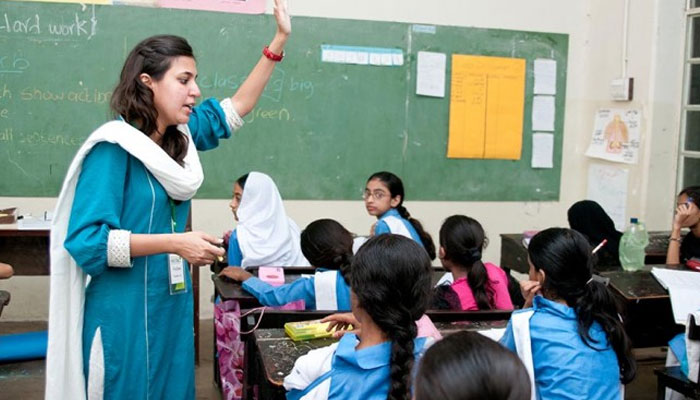FDE prohibits teachers from wearing jeans, T-shirts during duty hours
Research has proven that attire has an influence on people's perceptions and is more than just about something you are wearing, says FDE
ISLAMABAD: The Federal Directorate of Education (FDE) has introduced a new dress code for teachers, prohibiting the educationists from wearing jeans, tights and t-shirts during the duty hours, it emerged on Tuesday.
In a notification, the FDE directed the teachers to wear teaching gowns in class and lab coats in the laboratory.
The FDE has prohibited female teachers from wearing jeans or tights, while male teachers can't wear jeans and T-shirts. The FDE reasoned that research has proven that attire has an influence on people's perceptions and is more than just about something you are wearing.
"At first instance, the outlook imposes a very positive expectation subjective to the likeliness and behaviour pattern of the students," read the FDE notification.
What can female teachers wear?
For female teachers, a "simple and decent shalwar kameez/trousers shirt with dupatta/shawl" has been recommended by the regulatory authority.
Only formal shoes, which include pumps, loafers and mules, are allowed. But owing to long-standing hours during teaching, comfortable shoes like sneakers and sandals can be worn as well.
The teachers wearing headscarves will be allowed to wear scarves and hijab, it added.
What can male teachers wear?
Male teachers will not be allowed to wear shawls (chadars) during winter, but can wear sweaters, coats and jerseys.
If a male teacher is coming in to work wearing shalwar kameez, he has to wear a waistcoat with it.
If he is wearing a dress shirt, it should preferably be full sleeves with a tie and trousers. During the summers, a half sleeves dress shirt and/or bush shirt can also be worn.
For shoes, men can only wear formal shoes, which include dress shoes, loafers, Moccasins and boots. Sneakers and sandals can be worn too, but not slippers.
All non-teaching staff must also always maintain presentable attire and wear neat, clean and properly ironed clothes and appropriate shoes.
A note on "physical appearance" and personal hygiene was also given by the FDE, asking all heads of institutions to ensure that every staff member observes "reasonably good measures" in their physical appearance and personal hygiene. This includes a regular haircut, beard trimming, nail cutting, showers and use of deodorants/perfumes.
-
Security forces gun down 30 terrorists in multiple IBOs in KP: ISPR
-
MQM-P calls for new province in Sindh
-
US report validates Pakistan military edge over India: PM
-
Banned TTP poses serious threat to Pakistan security: UNSC panel
-
CM Afridi clarifies remarks on by-poll after ECP requests army deployment
-
Dubai sees 3.2m Pakistani passengers in 2025 as airport sets new milestone
-
Security forces kill 23 Indian proxy terrorists in KP's Kurram
-
Pakistan to construct island to boost oil exploration: report












